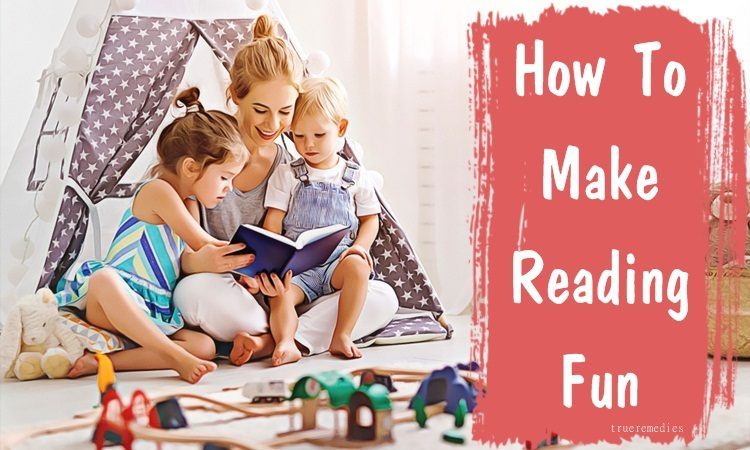Table Of Contents
Because children now prefer to use technology devices rather than reading, the speakers said that parents need to create space for them to have a better connection with books.
Books will help children equip their knowledge, develop their thinking, enrich their language treasures and promote their personality. Therefore, reading books will help children nourish their souls[1], their passion for learning, and start the process of self-improvement.
Many parents complain about why their children are more interested in using technology devices than books. And they do not know how to make reading fun for children and make them love books more. You can refer to some easy tips on our Truemedies.com site!
- Top 15 Simple Ways To Get Your Kids To Listen Without Yelling
- Warning Signs Of Family Stress To Watch Out Before Too Late
- Top 12 Unexpected Ways To Raise An Intelligent Child From An Early Age
How to Make Reading Fun: 8 Great Ideas Children Will Love
I. Benefits Of Reading Books For Your Child
Reading books brings children great benefits that surely few parents can think. The reasons below show us why children should read books.
1. Strengthen Parent-Child Relationship
As children get older, they enjoy playing, moving around and always exploring their surroundings. Pulling your child close with a book helps both you two calm down and enjoy the sweetness and cuddles like when he was little. Instead of treating it as a chore or an obligation, let reading books connect parents with their children naturally.
2. Promote Academic Skills
One of the benefits of reading books to children is to help them create better academic ability. Many studies find that children who are exposed to books before school age seem to do aspects related to formal education better[2]. In general, if a child has difficulty connecting words and sentences, will he be able to grasp and present the concepts of Mathematics, Natural Sciences, and Social Science?
TrueRemedies Partner Solutions

Need a Help from the Leading Expert Online, Available 24/7?
They’re all here and ready to answer your questions online or by phone. Keep asking questions until you get the answer you need.
3. Develop Basic Language Skills
If children have only essential daily communication, their vocabulary will be limited and the number of words easily repeated. Books will provide opportunities for children to expand their vocabulary, learn more sentence structures, know more idioms and proverbs, etc.
4. Train Your Child's Concentration Skills
An excellent benefit of reading is to help children increase their concentration ability[3]. With devices such as TVs and tablets, their concentration is passive. For reading, it requires children to relax their minds to focus on words. Thanks to this, the brain will be stimulated, improving the efficiency of concentration.
5. Stimulate Imagination And Creativity
One of the exciting benefits of reading is that children can express their unique imaginations. If every word is a framework, infinite creativity allows each child to build a world of his own.
Scientist Albert Einstein said: “Imagination is more important than knowledge. For knowledge is limited to all we now know and understand, while imagination embraces the entire world, and all there ever will be to know and understand.”
6. Acquire Knowledge Naturally
Each book is a vast treasure of information and knowledge. The more they read, the more they will know about the life around them and the world[4].
Even when reading stories, children also put in their knowledge bags exciting things. From the habits of animals, the customs of cultures to the basic scientific disciplines are reflected in books and then instilled into their brains naturally.
7. Reduce Stress
According to one study by the University of Sussex (UK) in the Telegraph, reading books can reduce stress by 68%[5]. This works not only for adults but also for children. After reviewing and completing homework, reading will help children relax and get ready for the next day.
II. How To Make Reading Fun For Children
1. Find Funny Books
You can buy a few funny books and keep them around your house. The Scholastic’s Kids and Family Reading Report found that 70 percent of 6- to 17-year-old children want to read books that can make them laugh[6].
Moreover, 91 percent of 6- to 17-year-old kids said their favorite books are the books they pick out themselves. Therefore, let children choose useful books of their interests for themselves. Take your child to the bookstore from time to time and see some age-appropriate books and suggest so that he can choose the ones he likes.
Reading books takes time, so you should not bring many books at the same time home because it will make your child feel choked with this pile of books. Instead, choose about 2 and 3 books and when your child is finished reading, buy other ones. Or, you can also give your child a book as a gift because any child would like to be given a gift. So, give him a book as a gift and remember to explain to him the meaning of the gift, which makes him feel excited and value reading more.
2. Give Babies Contact With Books From An Early Age
Creating a reading habit for children needs to go through a long, continuous process, and you should start this habit for your child as soon as possible.
Right from the time of pregnancy, you should begin to read to your baby every day. Not only does it help him to know the existence of books early but also help you to approach him in a close and intimate way. That helps him feel the warmth of your voice through great emotional stories. Also, reading to your baby in the womb is an effective way to help him develop language skills[7] and intelligence and give him interactive skills after birth.
3. Turn Books Into Funny And Witty Stories
Children can't imagine how important reading is, so turn it into funny and witty stories, which makes it easier to get into your child's mind. When reading books, you can illustrate with stuffed animals in your home, or you incarnate into the characters in the book. When your child feels interested in those characters, he will actively find good points in the book.
4. Interact With Children About Books
When your child is at the stage of being able to read a passage or a book, you should often talk about what they are reading. You should ask simple questions such as: “What do you think about this character?,” “Can you recap what you have read?”, etc. These are the questions to help your child's brain development[8] language development, and expression skills.
On the other hand, you should put the knowledge that your child has read from the book into practical application. For example, if the child has finished reading a story about piety, discuss the child: “How does piety in the family show?” or “To honor your grandparents and parents, what should you do?”.
5. Have A Plan To Encourage Reading Habits For Children
The desire to read can be temporary; if parents want to keep this passion, parents need to foster reading habits for children. For example:
- In the evening, for no particular reason, the whole family will sit quietly to read their favorite books.
- Order your children several newspapers or magazines annually and urge them to read them.
- Spend one day each week reading a newspaper with your child and then discuss enthusiastically on a topic of mutual interest.
- Spend time every week taking your child to the library, museums, exhibitions, etc. to visit, helping increase knowledge and improve reading interest for children.
6. Volunteer To Read Books For Your Child
If parents want children to have more contact with books, they should volunteer to read books to children. When children are young, their parents act as readers; every night, parents read a few fairy tales, celebrity stories, common sciences, etc. When children can read, their parents will become those who read books with them. At this time, parents will read classic literary works, scientific thesis papers, specialized essays, etc. with their children[9].
7. Agreement With Your Child On Reading Time
On baby's days off and holidays, you should plan for your baby about reading. You can create challenges for your child by setting goals for them to reach.
For example, “If you finish reading this book today, you will get 2 points. If you get 10 points, you will get a gift.” This is when you will give your child the gifts that they are forward to owning.
8. Pay Attention To The Intonation When Reading
When reading books to children, read aloud at a moderate pace[10]. Try to pay attention to the intonation depending on each character, helping to increase the interests of the story. For example, use trembling or angry tones to describe a scared or angry voice in dialogue. If your child likes stories, you can read them to him or let him read on his own. Afterwards, discuss the story with your child by asking questions and anticipating further developments of the story.
Books are a treasure of human knowledge. Therefore, teach children to reading habits and how to make reading fun for children from an early age. You need to pay attention to the orientation for children to read appropriate books but ensuring their interests.
Read more: 16 Effective Home Remedies For Tooth Decay Odor And Pain. This article was medically reviewed/fact checked by Dr. Millie Lytle ND, MPH.









